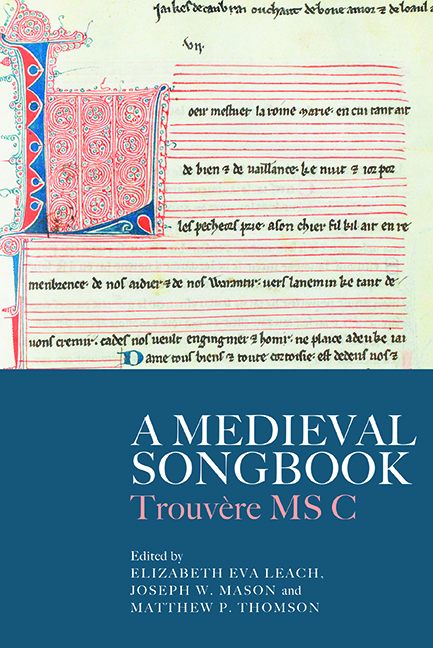Book contents
- Frontmatter
- Contents
- List of Illustrations
- List of Music Examples
- List of Tables
- List of Contributors
- Acknowledgements
- Abbreviations
- Editorial Practices
- Introduction
- Chapter 1 The Trouvère Manuscripts of the Burgerbibliothek Bern
- Chapter 2 The Lorraine Repertoire of C
- Chapter 3 Chansonnier C: Contents, Stemmatic Position, Particularities
- Chapter 4 A Note on the Decoration of C and its Artistic Context
- Chapter 5 Author Ascriptions and Genre Labels in C
- Chapter 6 Common Exemplars of U and C
- Chapter 7 Shared Small Sources for Two Early Fourteenth-Century Metz Chansonniers?
- Chapter 8 The Legacy of Thibaut de Champagne in C
- Chapter 9 Strategies of Appropriation in Jacques de Cambrai's Devotional Contrafacts
- Chapter 10 Jeux-Partis and their Contrafacts in C
- Chapter 11 C and Polyphonic Motets: Exemplars, Adaptations, and Scribal Priorities
- Appendix: List of Songs in C
- Bibliography
- Index of Sources
- Index of Songs
- General Index
- Studies in Medieval and Renaissance Music
Chapter 8 - The Legacy of Thibaut de Champagne in C
Published online by Cambridge University Press: 26 May 2022
- Frontmatter
- Contents
- List of Illustrations
- List of Music Examples
- List of Tables
- List of Contributors
- Acknowledgements
- Abbreviations
- Editorial Practices
- Introduction
- Chapter 1 The Trouvère Manuscripts of the Burgerbibliothek Bern
- Chapter 2 The Lorraine Repertoire of C
- Chapter 3 Chansonnier C: Contents, Stemmatic Position, Particularities
- Chapter 4 A Note on the Decoration of C and its Artistic Context
- Chapter 5 Author Ascriptions and Genre Labels in C
- Chapter 6 Common Exemplars of U and C
- Chapter 7 Shared Small Sources for Two Early Fourteenth-Century Metz Chansonniers?
- Chapter 8 The Legacy of Thibaut de Champagne in C
- Chapter 9 Strategies of Appropriation in Jacques de Cambrai's Devotional Contrafacts
- Chapter 10 Jeux-Partis and their Contrafacts in C
- Chapter 11 C and Polyphonic Motets: Exemplars, Adaptations, and Scribal Priorities
- Appendix: List of Songs in C
- Bibliography
- Index of Sources
- Index of Songs
- General Index
- Studies in Medieval and Renaissance Music
Summary
In the Old French deluxe chansonniers of the mid to late-thirteenth century, the organising principle was more often the author, and aristocratic poets like Thibaut de Champagne held pride of place. Collections like K and its related manuscripts open their compendious collections with a large section devoted to Thibaut's work. In M, Thibaut was originally only given a small part to play according to the table of contents, but during the execution of the codex, an entire compendium of his songs was interpolated into it, thereby enhancing Thibaut's presence considerably. The scope of songs is largely the same as in K and its analogues – N, V, and X– which leads many, including this author and his co-editors of Thibaut's songs, to conclude that a more-or-less official libellus of Thibaut's songs was in circulation shortly after his death in 1253. All these codices highlight Thibaut's generic range by opening with a collection of diverse genres before clustering love songs and debate songs together among other more heterogeneous sequences. They play up not only the massive number of songs that Thibaut composed, but also the generic breadth and depth of his lyric production.
As the thirteenth century began to wane, chansonnier compilers, or so the traditional view goes, began turning to other ways of organising their collections. For example, O, a Burgundian manuscript, is organised alphabetically by incipit, but the compiler continues to privilege aristocratic trouvères like Thibaut by putting his songs first in alphabetic groupings and endowing them with elaborate historiated initials. Moreover, the compiler of O manages to preserve some of the generic breadth of Thibaut's work: among the sixteen songs in O, we find not only love songs, but a pastourelle, a jeu-parti, and the famous crusade song, Seignor, sachies, qui or ne s’en ira (RS 6). Another manuscript – T – opens with a large section of Thibaut's songs before turning to a much more heterogeneous collection of works, mostly focused on the cultural milieu of late thirteenth-century Arras.
This traditional chronological explanation of organisation by author giving way to ordering by genre or incipit is somewhat oversimplified.
- Type
- Chapter
- Information
- A Medieval SongbookTrouvère MS C, pp. 146 - 157Publisher: Boydell & BrewerPrint publication year: 2022



